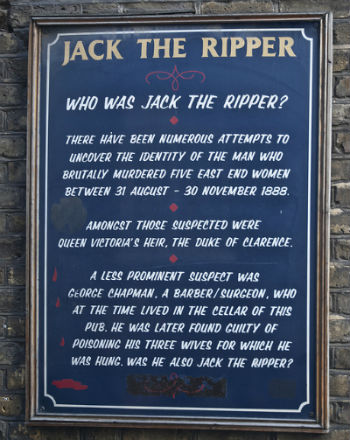 A graffiti artist's interpretation of Jack the Ripper
A recent newspaper report announced that there would be ‘Yorkshire Ripper’ tours for visitors to Bradford, visiting some of scenes of his crimes. A closer look at the facts casts some doubt on this, but let us imagine it were true. Many of us would find this distasteful, or even objectionable. Peter Sutcliffe, who was convicted of the crimes in 1981, butchered thirteen women between 1975 and 1980. It just seems wrong for people to visit the scenes of this suffering for the purposes of entertainment.
A graffiti artist's interpretation of Jack the Ripper
A recent newspaper report announced that there would be ‘Yorkshire Ripper’ tours for visitors to Bradford, visiting some of scenes of his crimes. A closer look at the facts casts some doubt on this, but let us imagine it were true. Many of us would find this distasteful, or even objectionable. Peter Sutcliffe, who was convicted of the crimes in 1981, butchered thirteen women between 1975 and 1980. It just seems wrong for people to visit the scenes of this suffering for the purposes of entertainment.
However, we seem not to have the same attitude to ‘Jack the Ripper’ tours which visit the sites where the Victorian serial killer butchered his hapless victims. These are very popular with tourists, and have been going on for years in the East End of London. Jack the Ripper committed at least five horrendous murders in the late 1880s. Why should the mere passage of time (temporal distance) make such a difference?
The reason, of course, is that we care less about things that happened many years ago than about things that happened more recently. However, that will not do as a reply as it simply puts off answering the question: is it right that we care less? Jack the Ripper’s victims suffered as much as the Yorkshire Ripper’s victims; they were all living, breathing, feeling individuals whose lives were cut horribly short.
One answer might be that there are people still living personally connected to the Yorkshire Ripper case who would be upset by the tours, and it is immoral to upset people unnecessarily. That is surely right; however, it does not appear to be what is at issue. Even if those people were not upset, there still seems to be something unsavoury about the Yorkshire Ripper tour that is not unsavoury about the Jack the Ripper tour.
 A plaque on a 'Ripper' tour speculating the Ripper's identity
Faced with this, we might want to change our minds, say that there is no difference, and find both tours unsavoury. However, if we still think there is a difference, this might reveal something interesting about the way we think about morality. It is easy to think that the contrast with thinking morally is thinking selfishly. After all, the moral thing to do is (for example) to divide the cake equally rather than cutting a very large slice for ourselves. Putting it another way, when we deliberate morally we do not consider matters from our perspective, but from no particular perspective; an impartial point of view. Quite what it is to be truly impartial is up for discussion. I might put aside my selfish desires, but what about my long-term projects? My family’s interests? My country’s interests? Our species’ interests? In particular, for our case, should we put aside our temporal perspective – that we are judging from the 21st Century?
A plaque on a 'Ripper' tour speculating the Ripper's identity
Faced with this, we might want to change our minds, say that there is no difference, and find both tours unsavoury. However, if we still think there is a difference, this might reveal something interesting about the way we think about morality. It is easy to think that the contrast with thinking morally is thinking selfishly. After all, the moral thing to do is (for example) to divide the cake equally rather than cutting a very large slice for ourselves. Putting it another way, when we deliberate morally we do not consider matters from our perspective, but from no particular perspective; an impartial point of view. Quite what it is to be truly impartial is up for discussion. I might put aside my selfish desires, but what about my long-term projects? My family’s interests? My country’s interests? Our species’ interests? In particular, for our case, should we put aside our temporal perspective – that we are judging from the 21st Century?
Putting aside our temporal perspective would lead to our judging either both tours wrong or neither wrong; the passage of time would make no difference. If we allow our temporal perspective it would make a difference. From now the Jack the Ripper tour is alright, even if it would not have been alright in 1885. However, allowing too much partiality is in danger of undermining morality altogether (remember the cake?) Some philosophers think that we should be as impartial as possible in our moral thinking. Things such as the satisfaction of our own long-term projects has no greater call on us than others’ long-term projects. We should not strive to benefit our families in particular, our fellow-citizens in particular, or even our species in particular. In thinking morally we should, in the words of Henry Sidgwick, think ‘from the point of view of the universe’.
Others regard this as senseless idealization; our moral thinking emerges out of, and cannot be totally removed from, our actual psychologies. Far from being pristine and rational, actual psychologies are messy, which puts a limit on the extent to which morality can be straightened out. Thinking about what you think of the two tours might help you work out on which side of this divide you fall.
Find out more on why people celebrate Jack the Ripper



Rate and Review
Rate this article
Review this article
Log into OpenLearn to leave reviews and join in the conversation.
Article reviews